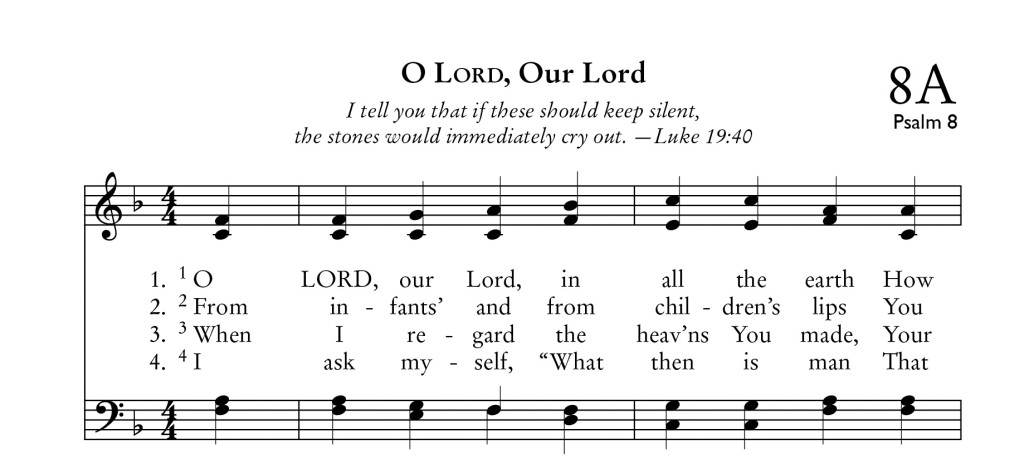You have 1 free article remaining this month.
Subscribe to the RP Witness for full access to new articles and the complete archives.
The psalter was not given to focus, finally, on former glory days of a posthumous, Israelite prince. Certainly, much is lost if we gloss over the historical setting of the Psalms. Yet, at Pentecost, Peter told hearers that David spoke in the Spirit of the promised Messiah. Near Emmaus, Jesus rebuked Cleopas for stunning ignorance: He proceeded to explain how all Old Testament texts testified eloquently to Christ.
More psalms than most people think directly predict Christ (Ps. 2, 45, 110). The majority, however, comment indirectly, in various ways, upon the Messiah’s person, work, titles, offices, and experiences (of suffering and glory), as well as to His body. Through union with Christ, lived out in David’s life, later humiliation and exaltation of Jesus was foretold, foretasted, and foreshadowed.
In an ultimate sense, all hymnbook entries, patterned on the biography of David and sons, prophetically point worshipers to Jesus. Humanity conceived, incarnated, humbled, and glorified is implicit in Psalm 139:14–15, 40:6–8, and 8:5–8. Divinity is asserted in Psalm 45:6 and 110:1. All mentions of God, Lord of Hosts, and Yahweh embrace eternal sonship. He is king (Ps. 20–21), priest (Ps. 110), and prophet (Ps. 22:22) in His threefold office. Titles such as anointed (Ps. 84:9), servant (Ps. 18:1), cornerstone (Ps. 118:22), son (Ps. 2:7), man (Ps. 8:4), and holy one (Ps. 16:10) ad-here to Him.
Singers, in the Spirit, publish treasures of His persecution (Ps. 2), crucifixion (Ps. 22), resurrection (Ps. 16), ascension (Ps. 68), exaltation (Ps. 110), return (Ps. 98), and dominion (Ps. 72). Pangs, prayers, and praises chart Christ’s steep path to death (Ps. 22), to which He obediently set His face, before ascent to the heights (Ps. 16, 23, 24). Messiah is that Word He gives, lives, loves, and is (Ps. 1, 19, 119). As God’s agent of creation (Ps. 102:25–27), redemption (130:7–8), and providence (104:10–30), our head “pops up” again as shepherd (Ps. 23, 80) and savior (Ps. 146:7–9) of Jacob.
All Songs of Ascents welled up in His heart and cascaded from His lips (Ps. 120–134). If all roads, at one time, led to Rome, all psalms direct us to the Messiah’s more-than-Solomonic ever-lasting empire (Ps. 72). His bride (Ps. 45) and body (Ps. 46–48) are dressed, defended, depicted, and delighted. Since our Master prayed, praised, preached, and personalized these lyrics, union with our Savior means we sing them in, with, for, and to Him. Highs He enjoyed and lows He endured provide an “anatomy” of “all parts” of our own soul-experience, too.
Put Psalm 8 on your messianic playlist; its theme is not “human status lost at creation” but “human lordship retrieved through redemption.” Eden-sounding language about the primeval rule of Adam should not hide the fact that David wrote this hit. Foes near and far, like Absalom and Amalek, were already trodden underfoot. The ark was at rest. Zion was a fort. The oath Nathan mouthed made God’s prince gasp at his predicted royal rank. Safe and secure, citizens sing of kingdom rule restored in Israel’s representative covenant head.
Deafening praise begins and ends this corporate song to Israel’s majestic Lord. Dumbstruck foes fume as “babes and infants” lisp. The son of Jesse’s “who am I?” becomes the more general “what is man?” Pits lead to peaks. A sub-angelic, messianic state, for snake-crushing exploits, means Jesus must temporarily take mortal flesh to taste death for sons he would later escalate. “You made him a little lower than the angels and crowned him with glory and honor.”
If Paul points weak, Ephesian hearts to the infinite resource of their super-exalted Lord, he borrows the preposition of Psalm 8 from Yahweh, who hyper-elevated glory above heavenly heights. Cosmic dominion is not just about governing all creatures and their actions. Psalm 8 does include “all flocks, herds, and beasts,” along with hawks and sharks, but also extends its orb over angelic hosts who serve salvation heirs.
Jesus muted foes by quoting this psalm about Jerusalem street-kids. It propelled Christ forward in His “no death, no glory” mission through rejection, scourging, and crucifixion. If, for His human nature, He returned thanks to His creator, He also marveled at God’s love that stooped to Adamites—prospect of glory filled His royal priestly heart with commitment and intent. Soon robes of imperial purple were swapped for incandescent glory, with Herod and Pilate forced to pay homage (Ps. 2). In heaven, right now, the Messiah rules all things to benefit His sheep.
With no fear of death, rejoice in hope because Jesus tasted death. If the psalms of Christ may seem curious, they can muzzle critics. If rank, riches, and reputation we currently possess are of little earthly consequence, heirs must press on to our celestial call above. As far as we grasp the hell our guilt deserves, and what the greatest name endured, we join this happy chant: O LORD, our Lord, how majestic is your Christ.

